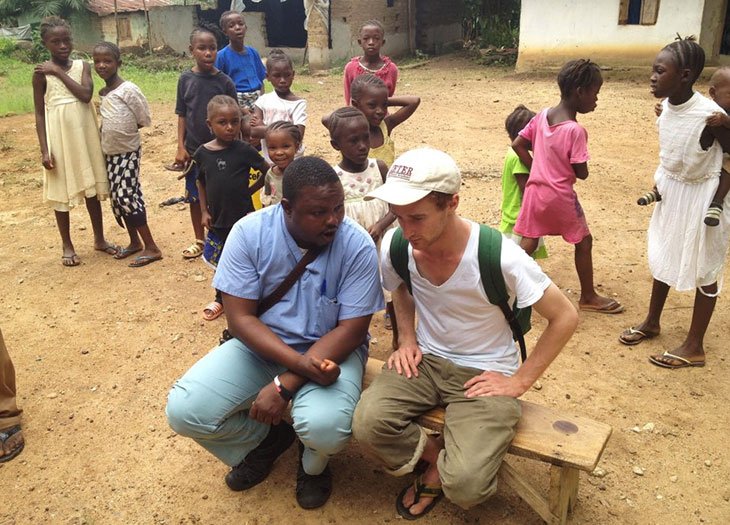Raphi Frankfurter

“There’s a certain pride in the country and readiness to move on ... that is extremely refreshing and inspiring.”
By Daneet Steffens ’82
When Raphael “Raphi” Frankfurter ’09 took on the position of executive director at the Wellbody Alliance in 2013, he had no idea to what extent his role — and the organization — would change. Frankfurter had been working with the Sierra Leone-based health organization on and off since engaging in a medical anthropology research internship with the nonprofit between his freshman and sophomore years of college.
“That was my first summer,” says Frankfurter, who graduated from Princeton with a degree in anthropology and a certificate in global health and health policy. “I was working in these camps that were set up for people who had been wounded and amputated during Sierra Leone’s civil war. I was trying to understand their lives — the poverty, the suffering, the maiming — and that experience was both intellectually fascinating and emotionally incredibly difficult.” The work and the country clearly got under his skin: He returned every summer to continue his research and volunteer for Wellbody, filling in organizational holes; as Wellbody thrived, so did Frankfurter’s relationship with the nonprofit.
Wellbody Alliance was co-founded — with the core belief that high-quality health care is a human right — in 2006 by Dan Kelly, an American medical student, and Mohamed Bailor Barrie, a Sierra Leonean physician, in Sierra Leone’s Kono District, an area in the country’s eastern region that is rich in diamonds and war-related devastation, but poor in health care access. For most of the 540,000-strong population, the Wellbody clinic is their only source of nontraditional health care. Since its inception, the organization has worked with community members as partners rather than just patients, developing a trusted position within Kono. “We have a unique relationship with this incredibly complicated community,” says Frankfurter. “The people have been exploited and hurt and are very poor, but because of our community-focused approach, they’ve grown to trust our medical center.”
Wellbody’s commitment to community came even more fully into its own during last year’s Ebola outbreak. “To expand our reach, we joined forces with Partners In Health, a big international NGO,” explains Frankfurter, noting that it was Wellbody’s integrated presence within Kono that piqued PIH’s interest. “This partnership has enabled us to grow exponentially. It means more staff, which means more programs: We’re in three different districts now, instead of one. Before Ebola, I spent about 40 percent of my time fundraising; now I can focus on our programs. We’re actually doing Ebola treatment, something we’d not have been able to do just under my direction. Our presence in the country with PIH has grown to create one of the major NGOs in Sierra Leone.”
Frankfurter, currently exploring M.D./Ph.D. programs for the fall, plans to combine an academic career with his international work, and has a particular interest in what he sees as a transformative opportunity for first-world universities to play a bigger role in global health. “I think the arguments that NGOs contribute to Africa’s lack of development are oversimplistic,” he says, “But ultimately a health care system cannot be run by NGOs; a health care system needs to be run by the government. Universities are pockets of incredible resources: They could work with governments to develop long-term, formal training and education programs to build up health care courses and systems, coupling that with research on how to do it well. PIH is currently innovating this approach with Harvard. It’s about building up medical schools overseas, bringing in academic clinicians, both to stock the health care system and to train local people in specialty care. It can be very different from the way NGOs can operate, which are often much more transient and less invested than this type of university partnership can be.”
For now, though, Frankfurter appreciates Wellbody’s community-driven work as true, effective dedication: “You know how English classes at Exeter taught us to think about individuals in their complexity, to talk about them respectfully as people? That’s a mental process that I use all the time. When there’s an Ebola patient who’s run away from their quarantined home and we need to go find them in the forest, that’s about knowing that they’re not ignorant — they’re afraid. We need to understand them and their family and their lives in order to understand what will draw them back for proper care.”
It’s taken Frankfurter time to gain that understanding, but that process has been one of the pleasures of his working experience. “I’m feeling more comfortable in Sierra Leone, beginning to get a sense of how to interact with people in a context so different to my own,” he says. “I think back to the first year I arrived, looking around and thinking, ‘What is this place?’ Now there’s a deep comfort I feel, knowing how to eat the food, how to joke with people — there’s a lot of ways in which I can connect better. But I’m still confronted every day with realms I don’t understand.” Despite such challenges, Frankfurter professes palpable admiration for Sierra Leone’s resilience. “It came out of this horrible civil war,” he says. “There’s a certain pride in the country and readiness to move on and a real aversion to violence that is extremely refreshing and inspiring.”
